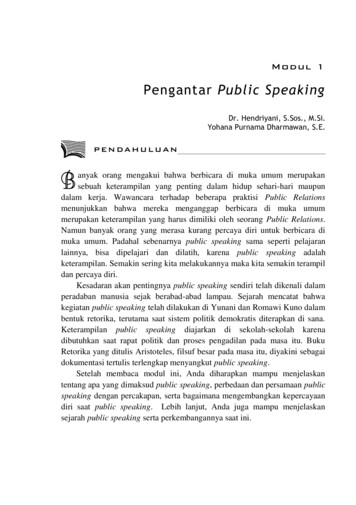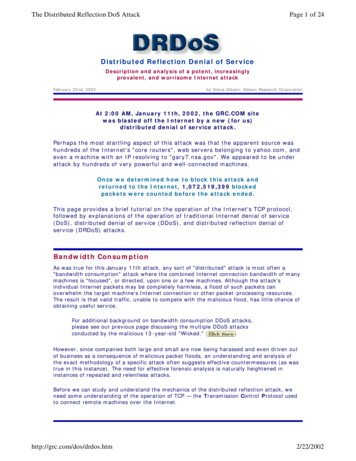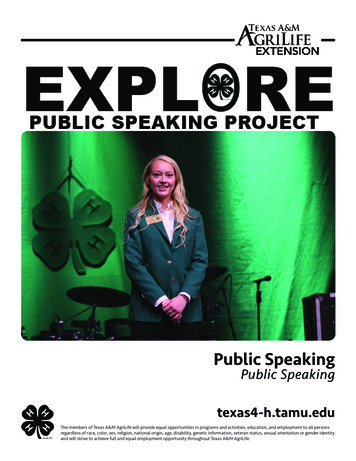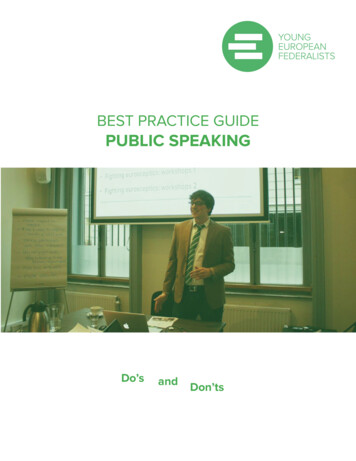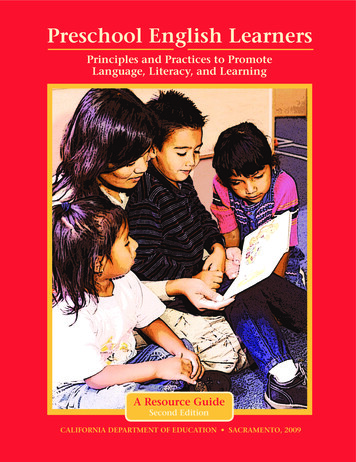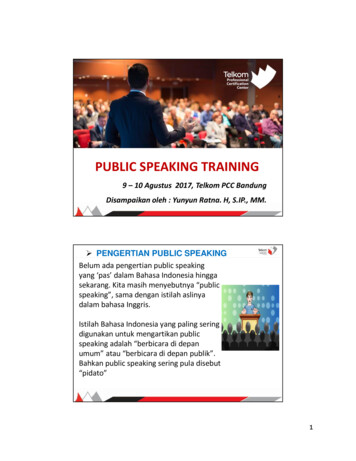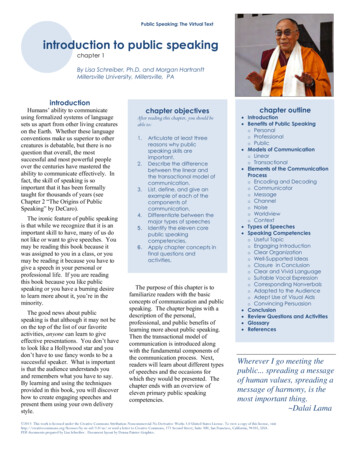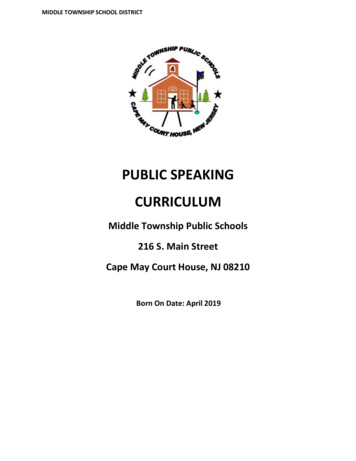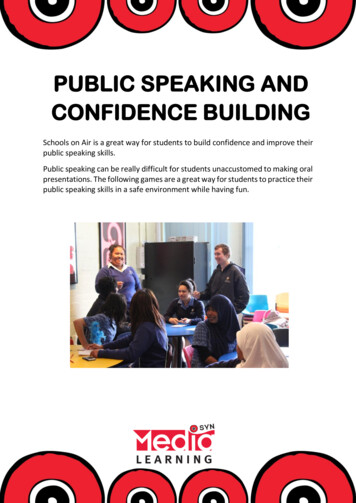
Transcription
PUBLIC SPEAKING ANDCONFIDENCE tmSchools on Air is a great way for students to build confidence and improve theirpublic speaking skills.Public speaking can be really difficult for students unaccustomed to making oralpresentations. The following games are a great way for students to practice theirpublic speaking skills in a safe environment while having fun.
The Um PoliceOverviewThis is a combination of two classic public speaking games, in this game studentslearn to speak clearly when improvising, without having to worrying aboutcontent.Number of students required:Ideally groups of three but any size group can workResources:100 words (cut out from sheet provided or make your own)Box, bag or hat for students to draw words out ofClock, stopwatch or phone to time playersMethod:Put the word cards into box, bag or hatStudents decide who is going to be the player, the timer and the um police.The player picks two cards and then must tell a one minute storyconnecting both words together convincingly. The story needn't be long,complicated or true. Students are not allowed to say um, ah, like or youknow.The timer times how long the player has been talking for, indicating thehalf-way point and 10 minutes to go.The um police records how many times the player says um, ah, like, youknow.Students rotate the roles until everyone has had a go at speaking. Thewinner is the student who said um and ah the least amount of times,although there is some competition involved, the atmosphere of theactivity should be relaxed and friendly.Once your class is comfortable with connecting two words, add to yourword collection and increase the number of cards selected to three oreven four or increase the time limit to 2 minutes.
allsandpalm tree
Take Over TopicOverviewThis game is similar to the Um Police game but is played by the whole class. Thisis a great game for preparing students for talking live on radio.Number of students required:Whole classResources:Topics written on small pieces of paper (can be prepared by studentsbeforehand)Clock, stopwatch or phone to time playersMethod:Divide your group into two teams and give them a speaking order ie,speaker 1, speaker 2 and so on.Nominate a team to start, speaker 1 takes a topic. The stop watch isstarted and they begin.The opposing team listens hard for opportunities to take-over the speech.They are when the speaker deviates, hesitates or repeats themself. Totake-over,theymustcallthechallenge.Example: The speaker's topic is tennis but he is talking about soccer. Thecalled challenge is deviation. The time keeper stops the watch.The challenger explains the call. The timekeeper judges whether or not itis fair. If it is, the challenger takes over, the stop watch is set again for theremaining time and now the starting speaker's team may challenge.If the challenge is unsuccessful, the original speaker continues.The goal for the speaker is to survive the minute. If they do so, they getten points. If they don't, whichever team is speaking last gets 5 points.A full game is when you have gone through all the speakers from eitherside.
Expert SpeakersOverviewThe goal of this activity is to improve eye contact, clear speech, and confidence(content isn't important since they are the only "experts" on their subjects!). Ifyou have extra time, they can make a picture or diagram to use as a visual aid.Number of students required:Students can complete this task individually or in pairs.Resources:PaperPenColoured Pencils/Textas (if making picture or diagram)Method:Give your students about ten minutes to make up the descriptions of theirimaginary animals using the question sheet as a guideline. If time permitsstudents can include a picture or diagram.Students present a short (1-2 minutes) report on their fictional animal.If time permits allow students to take questions from the audience, thiswill help to give students confidence thinking on their feet without havingto worry about giving the wrong answer as any answer they give is theright one because they are the experts!
Expert SpeakersUse the following questionnaire to create your own fictional animal and presenta report on it to your classmates. As you created the animal you are the world’sleading expert on it, this means that you can concentrate on how you speak(pace, clarity, making eye contact) rather than what you are saying.Name of animalWhat does it look like (size, teeth, fur, scales, nose, claws, color, tail, etc)?Is it a mammal, reptile, amphibian, marsupial?What does it eat? What eats it?What kind of habitat does it live in?Does it make a sound?What survival characteristics does it have (flies, swims, runs, digs,camouflages, fights, etc.)
Alvarez, E, Games on Public Speaking Skills for Kids, accessed from www.ehow.com/info 8003542 nDugdale, S, Develop Fluency, Spontaneity and Confidence while having Fun, accessed from cIntosh, J, Fun and Quick Public Speaking Activities, accessed Fun-andQuick-Public-Speaking-Activities.aspx
public speaking skills. Public speaking can be really difficult for students unaccustomed to making oral presentations. The following games are a great way for students to practice their public speaking skills in a safe environment while having fun. PUBLIC S

